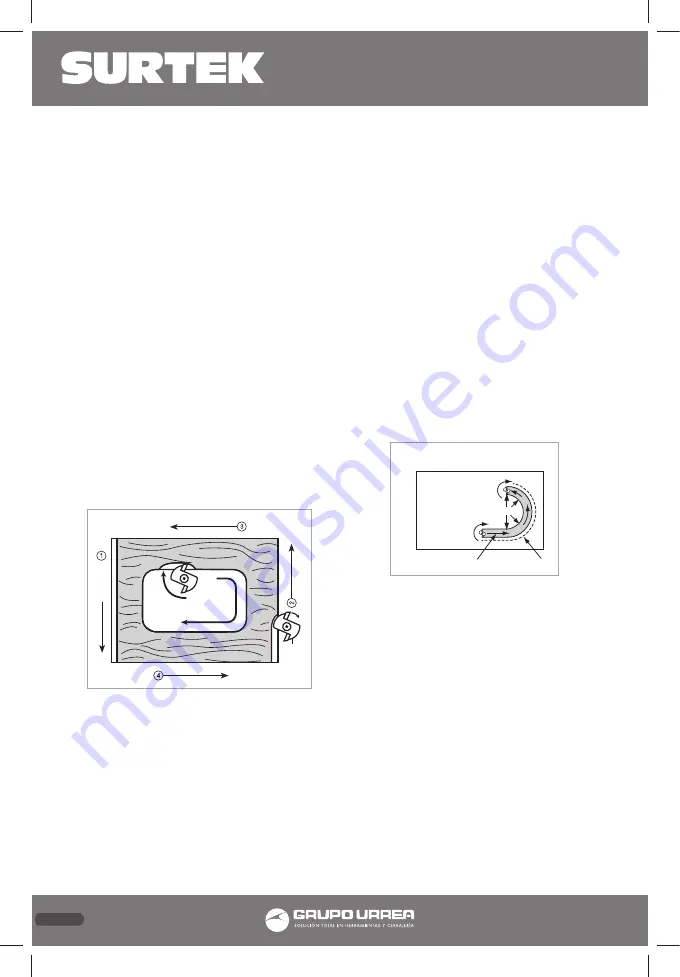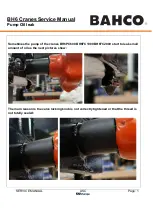
24
router base with both hands at all times. Fail-
ure to do so could result in loss of control caus-
ing possible serious personal injury.
FEEDING THE ROUTER
(FIG. 4)
The secrets to professional-looking routing are
careful setup for the cut, proper depth-of-cut
selection, knowing how the cutting bit reacts
in the work piece, and the rate and direction
of feed of the router.
DIRECTION OF FEED EXTERNAL CUTS
The router motor and cutting bit rotate clock-
wise. This requires the feed of the cutting bit
to be from left to right (see Fig. 4). Feeding
the bit from left to right will cause the bit to
pull the router towards (up against) the work
piece. If the router is fed in the opposite di-
rection (right to left), the rotating force of
the cutting bit will tend to throw the bit away
from the work piece, making it hard to control.
This is called “Climb-Cutting” cutting in the
opposite direction of the proper feed direc-
tion. “Climb Cutting” increases the chance of
loosing control, resulting in possible personal
injury.
When “Climb Cutting” is required (backing
around a comer, for example), exercise extreme
caution to maintain control of the router.
KICKBACK
Because of the high speed of the cutting bit
during a proper feeding operation (left to
right), there is very little kickback under normal
conditions. However, if the cutting bit strikes a
knot, an area of hard grain in the work piece,
or a foreign object, the normal cutting action
could be affected and cause “Kickback. “
This Kickback may cause damage to your work
piece, and could cause you to lose control of
the router, causing possible personal injury.
Kickback is always counterclockwise: the op-
posite direction of the clockwise cutting bit
rotation.
To guard against and help prevent Kickback,
plan the set-up and direction of feed so that
the router is always moving, and keep the
sharp edges of the cutting bit so that they are
biting straight into new (uncut) wood (work
piece). Also, always inspect the work piece
for knots, hard grain, and foreign objects that
could cause a kickback problem.
DIRECTION OF FEED - INTERNAL CUTS
When making and internal cut, such as a
groove, dado, or slot, the edge guide, straight
edge, or board guide must always be posi-
tioned on the right-hand side of the router as
you make the cut (Fig. 5).
When the guide is positioned on the right
hand side of the router, the router travel
should be from left to right and “counterclock-
wise“ around curves (see Fig. 5). This counter-
clockwise action around the curve could cause
“Climb cutting.“ Always be alert and exercise
extreme caution to maintain control of the
router when making this type of cut around
curves. When the guide is positioned as shown
in Fig. 6, the router travel should be from left
to right and clockwise around curves.
If there is a choice, the set-up in Fig. 5 is easier
to use, but there is the possibility of “Climb
Cutting” around curves. In either case (Fig. 5 or
Fig. 6), the sideways thrust of the router cut-
ting is always against the guide, as is proper.
FIG. 5
Guide Outside
Bit Rotation
Bit Rotation
Router Feed Direction
Guide
Thrust
FIG. 4
Router feed
Router feed
Router feed
Direction
Direction
Direction
Router feed
Direction
Bit Rotation
Rout end
Grains first





































